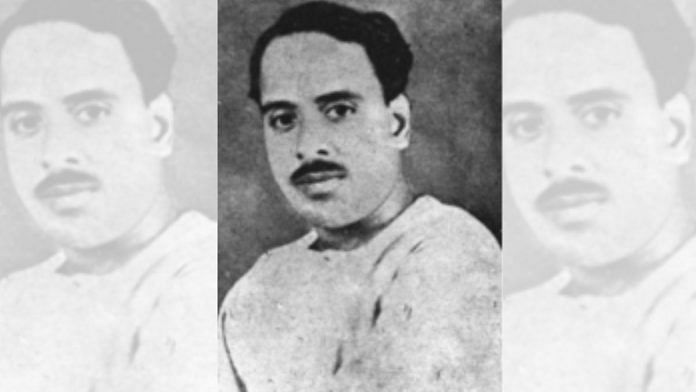The largest funeral gathering in the world according to the Guinness Books of World Records occurred on 3 February 1969, with over 15 million people paying their respects to one Conjeevaram Natarajan Annadurai – also known as C.N. Annadurai or ‘Anna’ in Tamil Nadu.
It was a day Panruti S. Ramachandran, the former minister of transport of Tamil Nadu recalled when all roads led to Madras (present-day Chennai). No transport was allowed to travel anywhere but to the city the day Anna’s body was being taken to its final resting place at Marina Beach, Ramachandran notes in his essay ‘Anna’.
Such was the stature of the last chief minister of Madras State, and the first of Tamil Nadu, that “the city of Madras or South India has never in its history witnessed a funeral as poignant as Anna’s,” wrote Ramachandran.
Making of a politician
Born on 15 September 1909 to middle-class parents from the weaver community in Kancheepuram, Annadurai graduated with a master’s in economics from Pachaiyappa’s College in 1934. He worked as an English teacher for nearly a year before turning to journalism and politics.
In college, Annadurai was known for his debating prowess and oratorical skills and was eventually elected as secretary of the College Union and chairman of the Economics Association.
His entry into the public sphere was through the Dravidian and anti-Brahmin movements prevalent in the state in the 1940s. He was considered to be the lieutenant of E.V. Ramaswamy, more commonly known as Periyar, according to a profile published by the Lok Sabha secretariat in 2002.
Eventually, Periyar and Annadurai had a falling out, leading to the latter forming the Dravida Munnetra Kazhagam (DMK) in 1949 – the political party currently in power in Tamil Nadu.
Also read: Mark Davidar was a true conservationist. Elephants were his bodyguards & best friends
The Parliamentarian
In 1962, Annadurai was elected to the Rajya Sabha (Council of States), and in his maiden speech, he excoriated the prevailing consensus in Parliament on democracy, socialism, and nationalism. While the speech is more famous for his call for a separate country for the Southern states, there are other valuable tidbits for today’s India.
“May I point out, Sir, that the strength of the Congress does not lie in itself; the strength of the Congress lies in the weakness of the Opposition parties. Therefore, instead of being jubilant over the victory, the ruling party should learn to be humble, magnanimous, liberal, and democratic,” said Annadurai.
The 1962 general elections saw the Indian National Congress (INC), led by Prime Minister Jawaharlal Nehru, win 361 out of 494 seats with 44.72 per cent of the total votes polled. The INC had just won its third consecutive general election.
Annadurai’s speech went on to logically showcase the pitfalls of whataboutery raised by the victorious parties when allegations of corruption were raised by the Opposition members in the House.
“Sir, as the Members on this side spoke about the corrupt practices in the elections, the people of the ruling party rose to ask whether it could be proved. Sir, may I point out that if we were able to lay our hands on proofs, we could have dragged them into courts of law rather than come to this august assembly to present our sentiments. It is not always easy for parties placed at a disadvantage to produce proofs,” added Annadurai.
A lot of what Anna spoke about makes for important reading for Opposition members in the ongoing budget session of Parliament.
Focus on Tamil, Tamil Nadu & power
Language – specifically Hindi – has long been considered by the leaders in New Delhi as an important factor to cement national unity and integration. Through the years, from the Congress rule in 1963 to the present day, the question of Hindi as a national language has been debated at dining tables, college classrooms, and political rallies. But for Annadurai, the question of Hindi was one of geographical imperialism.
“It was stated that Hindi has the claim to become the official language because it was spoken by 42 per cent of the population…but this 42 per cent is concentrated in compact and contiguous areas. It is not spread over,” said Annadurai during the debate on the Official Languages Bill, 1963.
He added that considering the 42 per cent would mean conferring a permanent, perennial advantage on a compact and contagious area in India conversely a permanent disadvantage to other areas.
English for him was not more important than his mother tongue, but the most “convenient medium” to spread its advantages and disadvantages equally.
In 1967, Annadurai was able to bring together the various Opposition parties in the then Madras State to win a majority in the elections. The United Front won 179 out of 234 seats, effectively finishing off the Congress in the state.
The question over the imposition of Hindi was the death knell of the Congress in Tamil Nadu. Since 1967, no leader from the Congress has held the position of chief minister in the state, except for the one-and-a-half-odd years of the President’s Rule.
On 6 March 1967, the first non-Congress government under Annadurai was sworn in and led by him for a little under two years, before his death. It was during his tenure that Madras State was renamed Tamil Nadu, pre-university (high school) education was made free for children whose parents earned less than Rs 1,500, and marriages performed without priestly intervention were legalised in the state.
According to Annadurai, India is a subcontinent not because of its geographic size but the diverse ethnicities and shared histories among the people. An individual who started as a secessionist in the Rajya Sabha, best described what India as a nation will always be.
“Indian society is plural, our political system is composite…India consists of various ethnic groups, India consists of various language groups and India has been termed very correctly as a subcontinent,” he said.



